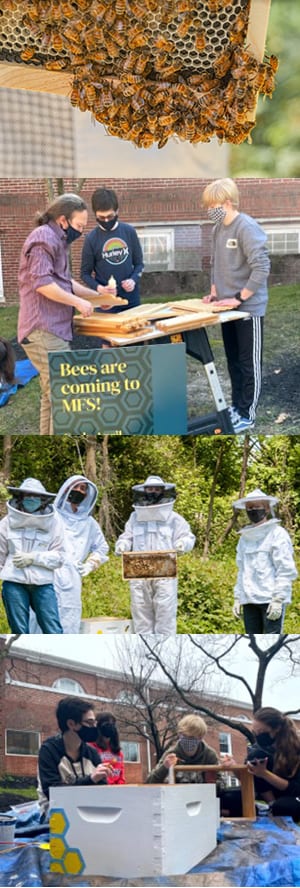Beekeeping Comes to MFS
 By Upper School Science Teacher Drew Newman (on behalf of the MFS Beekeepers)
By Upper School Science Teacher Drew Newman (on behalf of the MFS Beekeepers)
We are excited to announce the arrival of several thousand new members of the MFS community, in the form of a new honeybee colony on campus. The colony is located behind the community garden off of McShap Path.
A Student-Inspired Project
It all started several years ago, when students in the Animal Awareness Club became concerned about declining bee populations worldwide and decided that they should do something about it. Rachel Liu ’20 and Esha Nittoor ’20 translated their concerns into action by applying for a grant from the Friends Council on Education and secured nearly $2,000 to get the hives started. Their passion for the project was infectious, and a number of younger students were inspired to get involved. A Spring 2020 kickoff for the hive was set but, unfortunately, plans were slowed by the COVID-19 pandemic. Undeterred, the students used the lockdown period to begin learning on their own – even setting up hives at home! By the start of this school year, our new beekeepers (Daniel Sorokin ’23, Ashleigh Sorokin ’22, and Aidan Short ’23) were busy teaching others via Zoom and recruiting new workers.
___
Our New Community Members
There are literally thousands of species of insects that we collectively think of as “bees,” but there is only one that is the honeybee – Apis mellifera. They have the rare distinction of forming complex colonies for the purpose of producing honey to sustain themselves. Even though Apis mellifera is a wild species, they are partially domesticated, and have been selected for millennia to be docile and productive.
The possibilities for educational impact are enormous – students of all ages get to feel their connection to science in a unique way, and adults can experience the thrill of lifelong learning by getting involved in the care and maintenance of the hive.
Mostly, we step back and let the bees do the work. What could be more peaceful? It may take a little time, but we’ll all be able to enjoy honey harvested right here at Moorestown Friends School.
___
Community Safety
Honeybees are not naturally aggressive, and only direct threats to the hive will provoke them to sting a person. For this reason, our students take reasonable precautions and wear protective equipment when opening the hive. School beekeeping projects all around the country report no rise in “bee incidents” as a result of keeping hives on campus. Nonetheless, we have stocked EPI pens in multiple locations around campus. Students with a known bee allergy are cautioned not to participate in direct beekeeping operations. Only students with appropriate training will interact with the hive.
___
Honeybees, like human beings, are social creatures and thrive on community. Appropriately, the MFS beehive project is a true community effort.
We would like to express our appreciation to Ms. de la Torre, Ms. Godley, and the rest of the MFS Administrative Council for their enthusiastic support. Peer schools such as Germantown Friends School and Penn Charter have made us feel like we are joining a community of beekeeping experts, and have already provided valuable mentorship. Coordination through the student Environmental Club, faculty Environmental Stewardship Committee, and maintenance of various locations around campus will provide seasonal flowering plants to nourish the bees. Finally, the Upper School students themselves have such amazing plans to make this hive grow into an MFS tradition by teaching the younger members of our community about their connection to nature.
Everything we can do to support bee colonies helps these critical pollinators and fulfills our Quaker role as stewards of the Earth.
